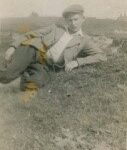
Shlomo Pieprz, the youngest in a family of four brothers and one sister, was born in Będzin in December 1927. His family was Orthodox. He attended a Jewish religious school where the language of instruction was Hebrew and Yiddish. He had many friends, socialized within the community, was also a good soccer player and enjoyed riding his prized bicycle. His father owned a shop that sold leather goods that were made in the family tanneries; his mother was a housewife. They were not wealthy but lived comfortably in a modest two roomed house.
In September 1939, when Shlomo was 12 years old, German forces occupied Poland. The Nazis closed all the Jewish schools and synagogues. In his testimony, Shlomo recalled how Nazis separated Jews from Poles; to frighten the population, they had to watch a public hanging in the main market. Shlomo went to work in a small suitcase factory. While he was able to remain with his parents and sister, one of his brothers was sent to Germany to work in a big factory and the other two brothers were taken to concentration camps. During a selection in 1942 his mother was taken to Auschwitz-Birkenau, and so were his sister and father later that year.
Shlomo was sent to forced labor in the IG Farben factory in Erfurt in 1942. After three months he was moved to Golleschau and then to the labor camp of Blechhammer, both sub camps of Auschwitz. In Blechhammer, he had a number tattooed on his arm. When the Soviet army was approaching, Shlomo and other surviving prisoners were forced on a death march that eventually took them to the Buchenwald concentration camp in Germany where he spent the last months of the war. In April 1945, the American army liberated Buchenwald. Shlomo later recuperated in a Displaced Persons camp in France before emigrating to Israel. There he met his future wife Evelyn from South Africa. Her family offered Shlomo a position in their engineering business in South Africa, and they moved to Johannesburg in 1956.
Of his family, only Shlomo and two of his brothers survived; one emigrated to the USA and the other to Israel. Shlomo did not have his bar mitzvah until the age of 83 in Johannesburg in the presence of his wife, children, and grandchildren. He died in 2014.
Shlomo Pieprz’s story is also featured in the permanent exhibition of the Johannesburg Holocaust and Genocide Center, South Africa.